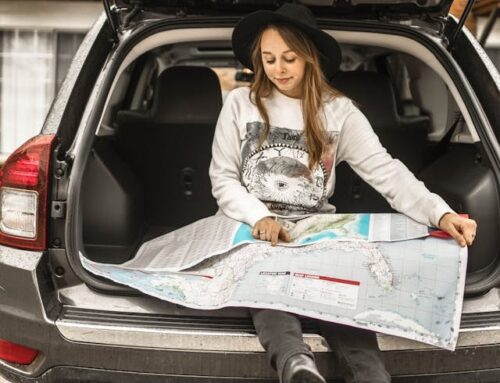Sustainable Travel Tips: How To Make A Green Impact And Have Fun

Eco-Friendly Travel Tips – How To Travel Sustainably and Have Fun

There has been a boost in the number of people who travel in the last few decades. You may have had vacations when you were younger, but now, the wanderlust bug has taken over. Along with hundreds of millions of people who board planes and fly to exotic locations, you’ve been bitten and are anxious to travel the world. You love it.
However, there’s something in the back of your mind that won’t go away. It’s a feeling you can’t seem to shake, no matter how hard you try – sustainability. You want to help the planet, and your daily routine reflects that fact. Still, traveling isn’t one-hundred-percent eco-friendly, and you feel bad that your actions are leading to more emissions hitting the atmosphere.
It’s a tricky dynamic. On the one hand, you want to do as much as you can to save the planet. On the other, you want to have fun and enjoy your life, and visiting different places and experiencing the culture and customs are fantastic ways to lead a fulfilling life. Thankfully, travel and sustainability don’t have to be at odds with one another as there are ways to manage both. Continue reading to learn more about how to make your trips greener and eco-conscious while enjoying your adventure.
Limit Plane And Boat Journeys
The trick is not to avoid plane journeys entirely. Although the world is smaller than previously, it’s still a big place and not everybody is lucky enough to live in mainland Europe. Thanks to the Schengen Agreement, people in closely located countries, can drive or hop on a train and be in a new country within minutes.
Sadly, you will probably have to pay for an airline ticket at some point during your trip. Of course, that doesn’t mean you must board airplanes regularly while traveling. The problem with a commercial passenger plane is the amount of CO2 that it releases into the atmosphere. Carbon Independent calculates the figure is as high as 90 kg per hour at a cruising speed of 780 km.
Boats are slower, yet they aren’t much healthier. Therefore, it’s essential to lean on alternative forms of transport when you need to hitch a lift. If there is a train, use it because it’ll lower your carbon footprint. It goes without saying that walking or cycling is incredibly sustainable transport methods when traveling short distances.
Okay, you can’t walk or cycle a couple of hundred miles to your next location, yet you can swap a cab for a bike when you arrive and want to explore the environment.
Travel In The Off-season
Before COVID-19 hit, there was a serious risk of over-tourism harming everything from the planet to local economies. Now, people are far more careful about how they travel. This is logical considering that a vacation may be called off within a day of booking transport and accommodation. Whether it will last once the crisis is over is another matter, but for now, you should use it to your advantage.
The peak season is over, which means it’s the off-season for the foreseeable future. That’s a good thing as traveling in the less busy periods is helpful to the environment and local communities. For one thing, it helps the businesses that struggle once the influx of tourists leave and return home. Secondly, if there are fewer people, it means there are fewer pollutants in the air. After all, the place isn’t packed.
You don’t even have to travel outside of the country if you are uncomfortable. Staycations are on the rise – Peek says internet searches for the best staycations destinations are up 10% year on year – and remaining at home is a responsible way to travel and explore your home nation.
If you want to go the extra mile, you can leave the car and book seats on a coach tour. It’s not as flexible, but it offsets pollution.
Stock Up On Cosmetics
Why do you waste so much time packing? As long as you have the essentials, you can pick up small things pretty much anywhere in the world. Lots of travelers are starting to fret about the packing process less and less, and it’s a powerful way to rein in your stress levels.
Unfortunately, it’s potentially bad for the environment and your body. When you buy cosmetics from stores you’re not familiar with, you can’t account for the products. An item that’s everywhere in the US may be tough to find in Southeast Asia, South America, or the Middle East. As a result, there’s no telling what’s in the bottle.
You can’t read the ingredients, either, so it’s not as if you can pick and choose by analyzing the packaging. Once your Clarins face toner or moisturizer runs out, you’re left with the stuff that isn’t eco-friendly or suitable for your skin. It’s a small thing, yet it makes a massive difference, especially since it’s easy to lose your inhibitions while traveling.
By stocking up on as many cosmetics as you can prior to your trip, you will be safe in the knowledge that your healthcare routine is healthy for your body and the environment.
Book Eco-Conscious Accommodation
Your digs make up for a significant chunk of your budget. That’s why it’s tempting to pay for the cheapest available accommodation and cut costs. But, when you do, you forget about sustainability and helping the planet. Yes, your bank balance benefits, but nobody else is on the receiving end.
Eco-conscious hotels have advanced a lot in the past decade. Today, there are hundreds of them in any given location, so you’re not short of options. Plus, hotels with solar panels and water-usage policies take the strain off the world’s already diminishing natural resources. At least food is cooked and rooms are lit via renewable energy methods, not burning fossil fuels.
For those who can’t afford a five-star hotel in Tahiti, there are alternatives. Hostelworld will highlight the hostels that emphasize sustainability, and you can book a private room instead of a dorm bed (hostels tend to be greener as the clientele are eco-friendly, as a rule). As basic as it sounds, you can camp too.
A tent and a gas cooker are all you require to be at one with nature. Camping is on point because you have fewer amenities and aren’t encouraged to indulge in unnecessary activities that lead to increased pollution. All you need to do is read the website before paying to see if you can find anything relating to eco-conscious measures.
Spend Money Locally
A mix of commercialism and globalization has led to big chains increasing their presence in remote places. Whether it’s London or Mexico, you’ll probably find H&M and Starbucks. Due to their familiarity, it’s tempting to spend your money at established chains as you know what you’re going to get.
However, it’s a bad move since it only encourages massive corporations to continue their expansion. As commercialism grows larger, the planet suffers – it takes tons of resources to erect a building and fill it with stock. Spending your money with local companies and traders ensures the cash stays with the people who need it the most.
Not only that, the things they source all come from the surrounding area, meaning that more local people prosper. Seen as it doesn’t have to travel far to reach your destination, the CO2 footprint will be smaller too.
From your perspective, you get an authentic experience you won’t forget, so it makes sense to keep it in the community!




